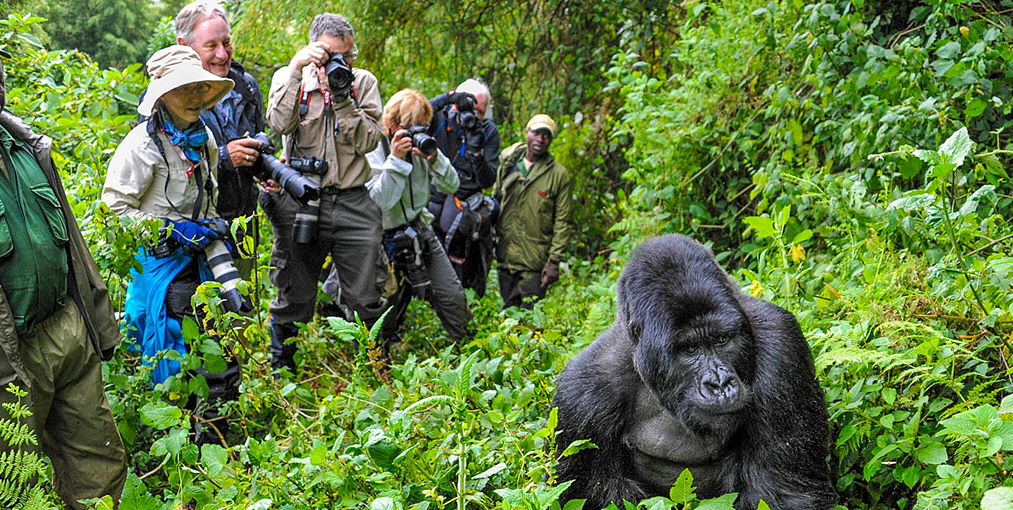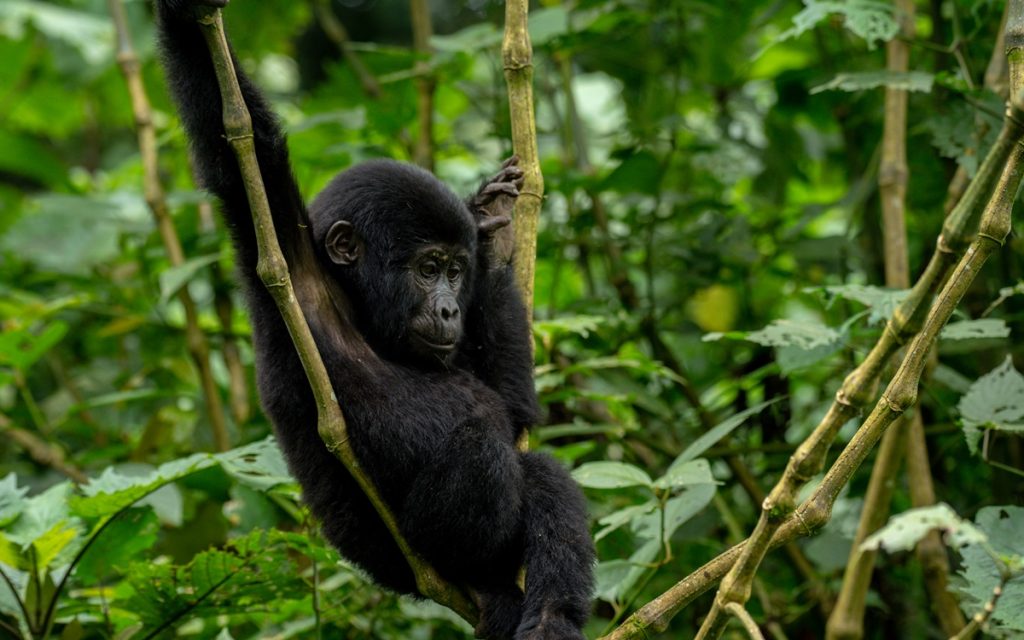- Written by: Friendly Gorillas Editor
- December 18, 2024
What do gorillas eat? Silverback gorilla diet
What do gorillas eat? | Silverback gorilla diet
Gorillas are majorly vegetarians and feed on vegetation, insects and stems however, Gorillas’ diet depends on their current habitat, season and age of the gorilla.
For example, mountain gorillas mainly eat green plants, while lowland gorillas consume more fruits.
During dry season when fruits are scarce, gorillas especially eastern mountain gorillas switch to seeds and tree barks and leaves.
Even if the western gorillas eat more fruit than leaves, stems, and shoots, they still consume less fruit when compared to chimpanzees.
Western gorillas have a diverse diet, eating around 200 plant species however, many gorillas prefer ginger and arrowroot plants.
Mountain gorillas in the Virunga Volcanoes have been seen to eat only about 38 plant species such as thistles, celery, and nettles compared to the over 200 plan species consumed by their counterparts in Bwindi.
Adult male gorillas eat about 30 kg of plants daily, while adult females eat 18 kg.
Gorillas have strong chewing muscles to handle this large amount of plant material, and their teeth are similar to human teeth, except for the long, pointed canines in adult males, which they use in fights, not for feeding.
Occasionally, gorillas eat soil, possibly to get minerals missing from their diet or to intoxicate themselves.

What Makes Gorillas So Big?
Gorillas are naturally designed to be giants and can grow large and powerful on a plant-based diet. They consume vast quantities of food daily—up to 30 kg for an adult male. Their robust digestive system allows them to extract nutrients efficiently from fibrous plants.
Key factors contributing to their size:
Calorie Intake: Gorillas consume enough calories to fuel their massive bodies despite eating low-calorie plants.
Muscle Mass: They rely on their diet’s high protein content found in leaves, stems, and seeds to build muscle.
Adaptations: Gorillas have large guts and specialized microbes in their stomachs to ferment fibrous material, maximizing nutrient absorption.
Suggested Safari Itineraries
What Do Gorillas Eat in the Wild?
A gorilla’s diet depends entirely on the plants in its current habitat and the season. For example, the food consumed by mountain gorillas in Volcanoes may not be exactly the same as that in Bwindi.
Western gorillas eat more fruit than eastern gorillas, as fruit is more abundant in their environment. In fruit-rich seasons, western gorillas focus on searching for fruit. During dry periods, they consume more leaves, stems, and other plant matter. Eastern gorillas, however, eat mostly vegetation, with fruit making up no more than 25% of their diet.
Gorillas eat around 200 different plant species. Their favorites include berries, bananas, and guavas. They also consume pith from certain plants and a large amount of leaves and plant stems.
During the dry season months, gorillas eat roots, bark, and other lower-quality plant material. They may also eat termites, ants, or grubs when available. On a given day, gorillas can eat 20 to 40 types of food.
What exactly do Baby Gorillas Eat?
Firstly, it’s important to know that newly born gorillas weigh just 4.5 pounds but are strong enough to cling to their mothers.
In their early ages just before 3 years, baby gorillas rely mostly on their mother’s milk.
As they grow, they start eating soft solid food, similar to adults, though some may also eat small insects like ants as they are nursed by their mother.
By around 4 years as the infant is ready for weaning, the young gorilla is able to start feeding by itself and may try some harder plant leaves, insects and stems.

Mountain Gorilla Food Intake
Adult mountain gorillas eat about 30 kg of food daily. They rarely drink water, as they get all the moisture they need from the plants they consume.
Do Mountain Gorillas Eat Meat?
Surprisingly, Mountain gorillas are herbivores and do not eat meat. In a few circumstances, gorillas however occasionally consume ants, termites or other invertebrates, but they do not hunt large animals
Recommended Safaris
11 days Uganda Premium Gorilla, Wildlife & River Nile Adventure
$ 2900
per personMethods of Collecting Food
Gorillas pluck and tear up plants with their amazing physical strength for example, a mature female or male gorilla may split a banana tree or bamboo tree in half and feeds on.
Just like humans, gorillas use their hands to pick through the leaves, pluck the stems and pluck to the mouth and sometimes, they use their lips to take out the pieces they want to eat.
Because of their level of intelligence, gorillas avoid depleting all the food in the area because they know they have to keep food for tomorrow, they instead manage the vegetation in a way that allows for rapid regeneration.
When it comes to drinking water, gorillas have been seen collecting water in their palms and drinking it. Gorillas do not drink much water because their diet has much water content already.

Experience Gorillas in the Wild
Join Friendly Gorillas Safaris for an unforgettable gorilla trekking adventure in Uganda’s Bwindi Impenetrable National Park, Volcanoes Park in Rwanda, or the DRC.
Witnessing these gentle giants as they play, relate and mate is considered one of the world’s most exciting and truly unforgettable adventure you do not want to miss.
Get in touch to start planning your safari of an unforgettable memories of a lifetime today.
Friendly Gorillas Editor

Ready for your ultimate wildlife experience?
Chat with us, our team is always here to help!
You may also like …

Got any questions
about traveling to Uganda?
Get in touch.








